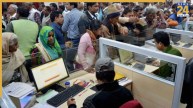Retail digital rupee: The Reserve Bank of India (RBI) has announced that the Retail Digital Rupee, the first retail digital currency pilot project, will be launched on December 1.
Retail digital rupee transactions will take place via a digital wallet on mobile phones and other devices. This trial’s eight banks have been identified for phased participation. Transactions in digital currency can only be made through digital wallets provided by banks participating in the RBI’s digital rupee scheme.
Digital currency notes: The digital retail rupee, which will serve as legal tender, will take the form of a digital token. The central bank will issue digital currency in the same denominations as coins and paper money.
How and where should digital currency be used?
To use UPI, you must have a UPI id or a QR code. In order to keep or transact in digital currency, you must be a part of the digital currency ecosystem, such as a digital rupee wallet. To transfer money to, say, a merchant, you’ll need a digital rupee QR code.
The RBI previously stated that CBDC will be a medium of payment that will be legal tender for all businesses, governments, citizens, and others. Core banking in CBDC will only debit your account once for currency purchases, but all subsequent transactions will be transferred from one wallet to another. More importantly, it is much safer and more convenient than cash.
The need to carry cash will not be reduced or eliminated with the introduction of digital currency.
Will the client be paid interest on his digital rupee?
There will be no interest earned on a digital wallet’s balance, just as there is no interest earned on cash carried in our pockets. Consider your e-wallet to be the location where your money would normally be.
What advantages will digital rupee have for the financial system?
Digital currency encourages financial inclusion while lowering the cost of creating money. CBDC can be used without an underlying bank account over time, thanks to policy unlocks, allowing users to hold and transact digital money just like they would physical cash.
During the pilot phase, the client would only encounter a very small portion of the full strategic block that the RBI has envisaged. Further developments in cross-border transactions, financial inclusion, and other areas may occur as a result of policy reforms.













